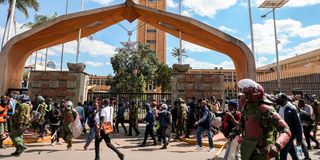Parliament breached, trust broken: Remembering the tipping point in Kenya's recent history

Police attempt to restrain demonstrators along Parliament Road in Nairobi on June 25, 2024.
What you need to know:
- June 25 protests reshaped Kenya’s history, exposing deep frustrations over governance, justice, and economic hardship.
- Witnessing Kenya’s unrest from abroad revealed the shocking magnitude of citizen anger and global ripple effects.
At about 3.30pm on June 25, 2024, my colleagues and I landed at the airport in Entebbe. We were heading to my company office in Kampala for a work assignment. One traveller, while scrolling through his phone, exclaimed, “Those guys were really serious! They entered Parliament!” I did not pay much attention to him.
Some of his travel companions quickly surrounded him to look at his phone. Their skin colour was Persian, or something to which I did not pay much attention. I just assumed whatever they were talking about had something to do with their country.
In the packed lobby, more people checked their phones and more exclamations came. The sheer audacity of breaking into Parliament was discussed in heroic and disbelieving tones. I knew we had ongoing protests in Kenya. In fact, I had arrived at the airport three hours earlier that day to be sure I did not run into any headwinds.
However, even with this knowledge, there was no way, in a million years, I would imagine Parliament being referred to would be Kenya’s. You can, therefore, imagine my shock when eventually, suitcase in hand and waiting for my colleagues to board the waiting taxi to Kampala, I finally checked my phone and realised that all the shock people were expressing in the airport lobby was about my country, Kenya!
This moment lived with the world, with me. It was a reminder of how far Kenyans can go to fight for their rights and demand justice.
Next Wednesday will be exactly a year since that fateful day – we lost lives, businesses were crushed, people were eternally maimed. That day divided our country’s recent history into two parts – before June 25 and after June 25. Increased taxation against a rising cost of living was a big cause of the protests, which reached a tipping point during the reading of the Finance Bill 2024, the day Parliament was breached.
When protesters took to the streets in June this year, there was an eerie resemblance with the anger that had taken people to the streets last year. Protesters came out to demand justice for 31-year-old teacher and blogger Albert Ojwang’, who died while in police custody in Nairobi. It is also a buildup of what remains largely unresolved since last year such as high cost of living.
For the newsroom, protests are a big news day. All reporters and photojournalists take position to ensure complete coverage and visibility of the activities, including protests. It was a reminder of the resilience of the profession.
Watching reporters go out on the streets, despite the uncertainty, was a strong statement against fear. The newsroom has remained determined to tell the story of the Kenyans on the streets; to show the world what was happening, to hold all duty bearers to account.
The unrest, the instability, the pain of parents and protesters, the loss of productive time… it is a whole basket of unwanted things, which remind us of how quickly things can go south. It is a clarion call for the government and leaders to honour their pledges, listen to the people and honestly commit to solving the issues eating up the country. The cost of civil unrest is too high on Kenyans, and completely unaffordable. We do not want to start retracing our steps when we are already a long way gone.
Postscript
On my way home on Thursday evening, I encountered a woman who was new in Nairobi. With certain routes blocked, she did not know how to get home. I left her standing next to patrol police from whom she went to seek refuge from the unpredictable crowds. One of the officers explained to her a way out of the city, to Kiambu, where she was going. She seemed so confused and worried under the darkening Nairobi skies. She spoke in perfect Swahili with that long lilt on vowels, which immediately told me she came from the Coast.
If the world was not as dangerous, and as volatile as it has become, I would have easily taken her home with me, at my expense. But I could not risk it. Besides giving her little money to top up her fare because of the 300 per cent hikes, the most I could really hope for was that she would be safe, and find her way home. May we not drive ourselves to such desperation and personal risks.
The writer is the Research & Impact Editor, NMG ([email protected]).


